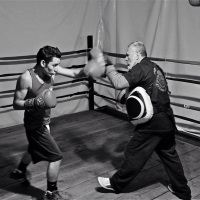Overtraining In Boxing | Is It Real?
The topic of overtraining is kind of a touchy subject in pretty much any sport out there, but so is in boxing.
Overtraining is definitely a real thing that happens to many fighters who try to make best of themselves. On this article i talk about how you can change the way you train and go about your life which should solve this problem.
Training isn’t the same for everyone

The amount of training you need depends entirely on what you are trying to achieve – if you’re an amateur boxer, it wouldn’t make any sense to strain yourself working out the same way as professional boxers, as they fight way more rounds.
In case that you’re just a person who wants to learn the ropes of boxing, or hit the heavy bag for weight loss purposes, the demand of getting good at it is even lower.
Signs of overtraining
First telltale sign of overtraining is feeling exhausted during the day. If you wake up and feel as if you haven’t rested at all, not excited and literally have to force yourself out of bed, that is often times an indication that you might need to take a couple of days off.
The problem with training when you feel tired is that there’s a bigger chance of getting injured, and overall not performing fully, as you won’t be mentally focused. More serious signs to look for are headaches, clumsiness which can clearly signify the need of rest, or something more serious. All in all, it’s your coach’s job to tell you whether or not you’re working too hard.
Important thing to remember
Your main goal as a boxer is to focus most of your time on actual boxing training, that is, hitting the heavy bag, mitts, speed bag, sparring and so on. If you put cardio, weight training or any strength and conditioning activity above that and spend most of the time on them, you can physically exhaust yourself too much.
Training more isn’t always the answer
Often times people think that if they train more they will get better quicker. There is definitely some truth to that, but not entirely.
Approaching your training hard but intelligently always beats just plain hard. The way you can determine whether or not you get better is by simply looking at your results – do you have more stamina, endurance? How better you handle yourself in sparring against tough opponents?
Having feedback and being conscious about the ways you go about your training will help you do that.
Mixing it up
The key in keeping your overall training more interesting and less injury inducing is trying alternatives to the ways you might be already working out. The staple of cardio in boxing is almost always running, so why not to try and do some swimming instead on some days?
Not to mention it can be less hard on your body, in particular your knees. Another thing you can do is use elliptical trainers or even rowing machines.
Rest and diet
What makes any type of exercework is rest. Now rest can be defined and achieved in many ways, but one of the most crucial is definitely sleep.
There numerous opinions on how long should a fighter sleep, but i would personally at least shoot for 8, but in case that when you wake up you still feel sleepy or tired, you could go longer.
Resting is also important in terms of taking a day off from training – it’s hard to say exactly how many days you can slack off during a week as often no one else than your coach will tell you that, but you should at least get a couple of days off during a week. If you’re not competing and feel completely winded, sometimes taking a week off is all you need, and i can assure you once you come back, you’ll feel better than ever.
Eating the right food isn’t just important in keeping your weight in check but to also fuel you for the day. Just look at how best boxers eat – they even have nutritionists to make sure they get enough micro and macro nutrients to work at their best. The staple oatmeal, chicken, rice and vegetables rarely go wrong, but feel free to change it with whatever other healthy alternatives you like.
There’s a reason why professional boxers don’t fight every month, and that has a lot to do with rest.